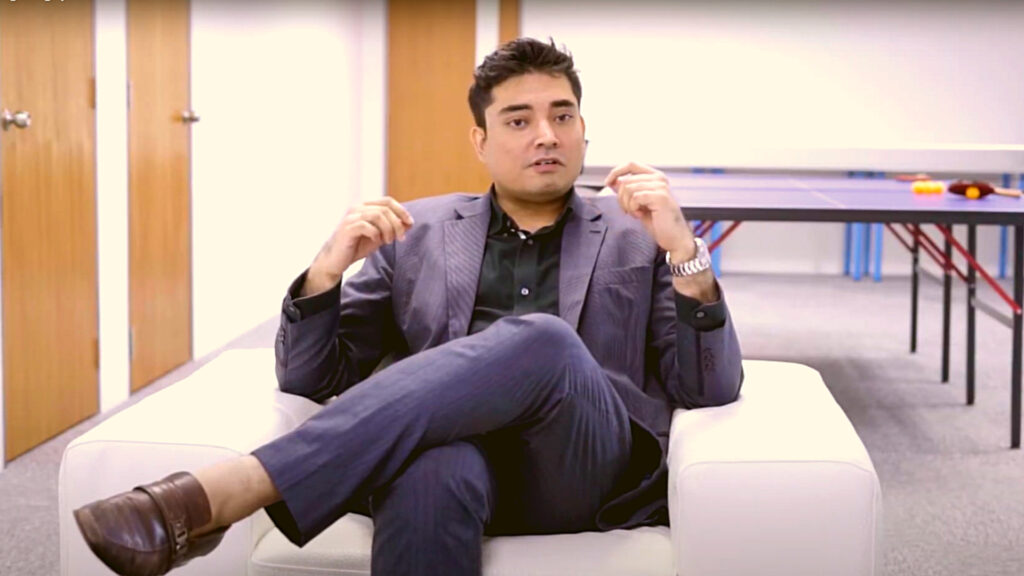Sancy Suraj is a Singaporean memory athlete and record holder, who has made a name for himself in the world of memory sports. He has set six national records in Singapore, including the record for reciting the most digits of pi, and most recently, for memorizing 1,119 digits of Euler’s number. In this article, we delve into Sancy’s thought process and approach to memorizing such large numbers, the memory techniques he uses, his practice sessions, and how he stays motivated during the process.

Can you tell us about your thought process and approach to memorizing such a large number of digits of Euler’s number?
Certainly, I would be happy to share my thought process and approach to memorizing such a large number of digits of Euler’s number. First and foremost, it is important to understand that memory techniques require a great deal of practice and discipline. There is no shortcut to developing a strong memory. With that being said, my approach involves using a combination of visualization, association, and repetition.
To begin with, I divided the digits of Euler’s number into smaller groups of 10. This helped me to focus on a smaller set of digits at a time and make it easier for me to visualize and remember them. I used a visual memory technique called the method of loci, which involves associating each group of digits with a specific image or location in my mind. For instance, I associated the first group of digits with an image of a flower, and I placed this image in a specific location in my mind, such as a particular room in my house.
Once I had associated each group of digits with a unique image or location, I would then repeat them over and over again in my mind until they were ingrained in my memory. Repetition is crucial in reinforcing long-term memory. I also used mnemonic devices, such as acronyms, to help me remember specific patterns or sequences within the digits.
Overall, my approach to memorizing Euler’s number involved a combination of visualization, association, and repetition. It required a great deal of practice and dedication, but it was a rewarding experience to break the Singapore record for memorizing this irrational number. I hope my success can inspire others to explore memory techniques and unlock their own potential in this area.
What kind of memory techniques did you use to crack the code of memorizing Euler’s number, and how did you develop these techniques?
As I mentioned earlier, I used a combination of memory techniques to memorize Euler’s number. These techniques included visualization, association, repetition, and the method of loci.
Visualization is a powerful memory technique that involves creating vivid mental images of the information you want to remember. For example, to remember a sequence of numbers, I would convert each digit into an image or symbol and then string them together into a story or mental image. These images would then be easier to remember than a long string of numbers.
Association involves linking the information you want to remember with something else that is already familiar to you. For example, to remember a list of random words, I would link each word to something that is already familiar to me, such as a person or a place.
Repetition involves repeating the information over and over again to help reinforce it in your memory. This is a crucial step in the memorization process and helps to transfer information from your short-term memory to your long-term memory.
The method of loci, also known as the memory palace technique, is a memory technique that involves associating each piece of information with a specific location in a familiar place, such as a house or a street. This makes it easier to remember information by mentally walking through the familiar place and recalling the information associated with each location.
I developed these memory techniques through research, trial and error, and practice. I studied the works of memory experts and experimented with various techniques until I found what worked best for me. Over time, I refined and perfected these techniques through practice and repetition.
In conclusion, memory techniques are a powerful tool for anyone looking to improve their memory. By combining visualization, association, repetition, and the method of loci, I was able to memorize Euler’s number and break the Singapore record. With practice and dedication, anyone can develop these memory techniques and unlock their own potential in this area.
How did you stay motivated during the process of memorizing such a large number of digits, and what kept you going?
Staying motivated while memorizing a large number of digits requires a lot of mental and emotional stamina. The process can be tedious and challenging, and it can be easy to lose focus or become discouraged. However, I found several ways to stay motivated throughout the process.
One of the things that kept me going was my desire to break the Singapore record for memorizing Euler’s number. I set this goal for myself early on and used it as a source of motivation and inspiration. I also kept track of my progress and celebrated small milestones along the way. This helped me to stay focused and motivated, even when the process became difficult.
Another thing that helped me stay motivated was my love for memory techniques. I find them fascinating and enjoy exploring the many different ways to improve memory. This passion for the subject helped me to stay engaged and motivated, even when the process of memorizing digits became tedious.
In addition, I had a support system of friends and family who encouraged me throughout the process. They provided me with words of encouragement and support, which helped me to stay positive and focused. They also held me accountable and reminded me of my goal when I felt discouraged.
Finally, I found that taking breaks and practicing self-care were essential to staying motivated. I made sure to take regular breaks, exercise, and get enough rest to help keep my mind and body in good shape. This helped me to recharge and stay focused, even when the process became challenging.
In conclusion, staying motivated during the process of memorizing Euler’s number requires a combination of goals, passion, support, and self-care. By setting achievable goals, cultivating a love for memory techniques, building a support system, and taking care of myself, I was able to stay motivated and ultimately break the Singapore record.
“Motivation is the fuel that drives us to achieve extraordinary feats of memory. From setting ambitious goals to cultivating a passion for the subject, building a support system, and practicing self-care, staying motivated is the key to unlocking our cognitive potential and achieving remarkable memory feats.”
Can you walk us through a typical practice session for memorizing Euler’s number, and how did you measure your progress?
My typical practice session for memorizing Euler’s number involved several steps. First, I would review the digits that I had already memorized. This served as a warm-up and helped me to reinforce the information in my memory. Next, I would work on memorizing a new set of digits. I would start by breaking the sequence into smaller chunks, typically 10-20 digits at a time. Then I would use a combination of visualization, association, repetition, and the method of loci to memorize each chunk.
For example, I might convert each digit into a symbol, such as a letter or an object, and then create a story or mental image to link them together. I might also associate each chunk with a specific location in my memory palace, such as a room or a landmark. Then I would mentally walk through the memory palace, recalling each chunk in sequence.
After memorizing a new set of digits, I would test myself to see how well I had retained the information. I might write down the digits from memory or recite them aloud. If I had made a mistake, I would review the chunk and try again until I could recall it accurately.
To measure my progress, I used a combination of time and accuracy. I would time how long it took me to memorize a set of digits and aim to improve my speed over time. I would also track how many mistakes I made and aim to reduce the number of errors.
Additionally, I would periodically test myself on larger sections of the sequence to see how well I could recall the information as a whole. This helped me to identify any gaps in my memory and focus on areas that needed improvement.
In conclusion, a typical practice session for memorizing Euler’s number involved reviewing previously memorized digits, memorizing new chunks using memory techniques, and testing myself for accuracy and speed. By tracking my progress over time and testing myself on larger sections of the sequence, I was able to measure my progress and identify areas that needed improvement.
What does this record-breaking achievement mean to you, and how has it impacted your life and career?
Breaking the Singapore record for memorizing Euler’s number was an incredible achievement for me, and it means a great deal to me personally and professionally.
On a personal level, it was a major accomplishment that required a lot of hard work, dedication, and perseverance. It was a goal that I set for myself, and I am proud to have achieved it. It has also given me a great sense of confidence and self-belief, knowing that I am capable of achieving big goals if I put my mind to it.
On a professional level, this achievement has opened up many opportunities for me. It has helped me to gain recognition in the memory and mental sports community, and I have been invited to participate in various events and competitions. It has also led to opportunities to work with businesses and organizations that are interested in memory training and mental performance.
More broadly, this achievement has also helped to raise awareness of the power of memory techniques and the benefits of training the mind. I hope that by sharing my experience and knowledge, I can inspire others to explore the world of memory training and mental performance.
In conclusion, breaking the record for memorizing Euler’s number has had a significant impact on my personal and professional life. It has given me a sense of pride, confidence, and achievement, and opened up many exciting opportunities. It has also allowed me to share my passion for memory training and mental performance with others and make a positive impact on their lives.
“Breaking records isn’t just about achieving a momentous feat, it’s about unlocking your full potential and opening doors to new opportunities. My achievement in memorizing Euler’s number has given me the confidence to pursue my passions, create meaningful connections, and inspire others to explore the limitless power of the human mind.”
When asked about his thought process and approach to memorizing Euler’s number, Sancy explains that he used a technique called the ‘memory palace’ to break down the number into smaller chunks and assign each chunk to a specific location in his imaginary palace. He then visualizes the information in each location to create a vivid mental image that is easier to remember.
Sancy developed this technique through years of practice and experimentation, and he believes that anyone can learn and improve their memory with the right training and techniques. He also emphasizes the importance of regular practice and consistency to maintain his memory skills.
During practice sessions, Sancy typically spends several hours each day working on memorizing numbers and other information using his memory palace technique. He measures his progress by tracking how many digits he can memorize in a certain amount of time and by testing himself regularly to ensure he is retaining the information.
For Sancy, breaking the record for memorizing Euler’s number was an incredible achievement that has had a significant impact on both his personal and professional life. He feels a great sense of pride and accomplishment and hopes to inspire others to explore the world of memory training and mental performance.
What message would you like to send to others who are interested in pursuing their own memory challenges or breaking records like you have?

To anyone who is interested in pursuing their own memory challenges or breaking records like I have, I would like to offer a few pieces of advice:
Firstly, it’s important to set realistic and achievable goals. While it’s great to dream big and aim high, it’s also important to break down your goals into smaller, more manageable steps. This will help you to stay motivated and focused, and avoid getting overwhelmed by the task ahead.
Secondly, practice consistently and regularly. Memory techniques are like any other skill – they require practice to develop and maintain. Set aside time each day or week to work on your memory challenges, and be consistent in your practice. Over time, you will see progress and improvement.
Thirdly, don’t be afraid to experiment and try new techniques. Everyone’s brain is different, so what works for one person may not work for another. Try out different memory techniques and find what works best for you.
Lastly, don’t be discouraged by failure. Memory challenges and record-breaking attempts are not easy, and it’s likely that you will face setbacks and obstacles along the way. But every failure is an opportunity to learn and grow. Use your failures as motivation to keep going and improve.
In conclusion, pursuing memory challenges and record-breaking attempts can be a rewarding and fulfilling experience. Set realistic goals, practice consistently, try new techniques, and don’t be discouraged by failure. With hard work and dedication, anything is possible.
“Unlock the untapped power of your mind through memory challenges and record-breaking attempts. Set goals, practice diligently, embrace experimentation, and never fear failure. Your determination and perseverance will lead you to achieve greatness beyond your imagination.”
In conclusion, Sancy Suraj’s record-breaking memory of Euler’s number is an incredible achievement that highlights the power of memory techniques and the benefits of mental training. His dedication, perseverance, and hard work have led to multiple national records and a reputation as one of Singapore’s top memory athletes. Sancy’s story serves as an inspiration to others who may be interested in pursuing their own memory challenges and breaking records.





























